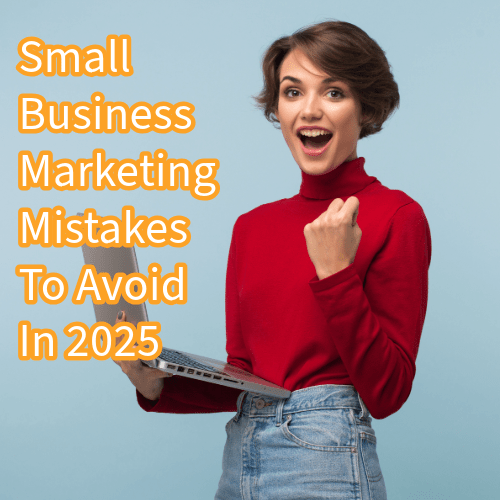
Marketing is the cornerstone of business success, especially for small businesses striving to discover their niche in competitive markets.
However, the dynamic nature of the marketing landscape, driven by technological advancements and changing consumer preferences, makes it easy to misstep.
In 2025, small business owners must be vigilant to avoid common marketing mistakes hindering growth.
Here are some small business marketing mistakes to avoid and drive growth in 2025.
Small Business Marketing – Mistakes To Avoid In 2025

- Neglecting to Define a Clear Target Audience
A common mistake small businesses make is trying to appeal to everyone. Without a clearly defined target audience, your marketing campaigns risk being too generic to resonate with anyone effectively.
In 2025, consumer expectations are higher than ever, and personalization is key.
Solution:
Create detailed buyer personas that include demographics, preferences, behaviors, and pain points. Utilize tools like Google Analytics, social media insights, and customer surveys to gather data.
By understanding your ideal customer, you can craft messages and boost engagement.

- Underestimating the Power of Social Media
While most businesses recognize the importance of social media, many fail to leverage its full potential. Posting irregularly, ignoring engagement metrics, or choosing the wrong platforms can render your marketing strategy.
Solution:
Develop a robust social media strategy tailored to platforms where your audience spends their time. For instance, TikTok and Instagram may be ideal for visually engaging products, while LinkedIn suits B2B marketing.
Consistency is crucial. Create a content calendar to maintain regular posts and engage with your audience by responding to comments and messages.

- Failing to Embrace Video Marketing
Video content continues to dominate digital marketing in 2025. Small businesses that neglect this trend miss out on a powerful way to engage audiences and communicate brand stories.
Solution:
Start small with short-form videos for platforms like Instagram Reels, TikTok, or YouTube Shorts. Showcase behind-the-scenes glimpses, customer testimonials, or how-to tutorials.
Tools like Canva and AI-driven video editors can help create professional-quality videos in 2025.

- Ignoring SEO Trends
Search engine optimization (SEO) remains a critical aspect of online visibility. However, outdated tactics like keyword stuffing or neglecting mobile optimization can hurt your rankings.
Solution:
Stay updated on SEO best practices, such as optimizing for voice search, focusing on local SEO, and producing high-quality, relevant content. Tools like SEMrush or Ahrefs can help you track keyword performance and analyze competitors’ strategies.
- Overlooking Email Marketing
Despite the rise of social media and other channels, email marketing remains one of the highest ROI strategies. Yet, small businesses often overlook or execute it poorly by sending generic or infrequent emails.

Solution:
Build a segmented email list to send personalized messages. Use email automation tools to send newsletters, promotional offers, or follow-up messages based on user behavior. A/B testing subject lines and content can also optimize open and click-through rates.
- Not Monitoring Analytics
Many small business owners launch campaigns but fail to measure their effectiveness. Without analytics, it’s impossible to understand what’s working and what needs adjustment.
Solution:
Leverage analytics tools like Google Analytics or HubSpot to monitor key performance indicators (KPIs). Track metrics such as website traffic, conversion rates, and engagement levels to make data-driven decisions that refine your marketing strategy.
- Relying on Paid Ads
While paid advertising can deliver quick results, over-reliance on it can drain budgets without fostering long-term growth. Some businesses become overly dependent on ads without exploring organic marketing avenues.

Solution:
Balance paid campaigns with organic strategies like content marketing, SEO, and community engagement. Paid ads should complement your overall strategy, not be the sole driver of traffic and sales.
- Failing to Prioritize Mobile Users
The majority of internet traffic comes from mobile devices, businesses that don’t optimize their marketing for mobile users risk losing a significant portion of their audience.
Solution:
Ensure your website is mobile-friendly, with fast loading times and easy navigation. Consider mobile-specific platforms like SMS marketing for direct communication.

- Neglecting Customer Reviews and Testimonials
In an age where social proof influences purchasing decisions, ignoring customer feedback is a mistake. Negative reviews can damage your reputation, while positive ones can boost credibility.
Solution:
Encourage satisfied customers to leave reviews on platforms like Google, Yelp, or Trustpilot. Respond to positive and negative reviews professionally and promptly.
Showcase testimonials on your website and marketing materials to build trust with potential customers.

- Overcomplicating Your Message
Some small businesses overcomplicate their messaging with jargon or excessive details, leaving their audience confused.
Solution:
Keep your messaging simple, clear, and focused on the value you offer. Use plain language and emphasize the benefits of your product or service. Test your messaging with a small audience to ensure it’s easy to understand and compelling.
- Overlooking Collaboration Opportunities
Many small businesses are missing opportunities to collaborate with other brands, influencers, or community organizations.

Solution:
Partner with complementary businesses or influencers to co-host events, create joint content, or cross-promote products. Collaborations can expand your reach and introduce your brand to new audiences.
- Ignoring Sustainability and Ethical Marketing
Today’s consumers prioritize brands that demonstrate social and environmental responsibility. Ignoring these values can narrow your marketing strategy and your business.
Solution:
Highlight your commitment to sustainability, ethical practices, or community involvement in your marketing campaigns. Transparency about your efforts can build stronger connections with socially conscious consumers.
- Not Adapting to AI and Automation
Artificial intelligence (AI) and automation are revolutionizing marketing, but small businesses fail to adapt.

Solution:
Explore AI-powered tools for customer support, content creation, or personalized marketing. For instance, chatbots can handle routine inquiries, and AI-driven platforms can analyze customer behavior to deliver tailored recommendations.
Start small and scale as you gain confidence in these technologies.
- Failing to Build a Strong Brand Identity
A lack of cohesive branding can confuse customers and weaken your market position. Consistency in visual elements, tone, and messaging is essential for brand recognition.
Solution:
Develop a brand style guide that outlines your logo usage, color palette, fonts, and tone of voice. Apply these elements consistently across all marketing channels to create a professional image.
- Ignoring the Power of Community Engagement
Many small businesses overlook the value of engaging with their local or online communities. Building strong relationships can enhance brand loyalty.

Solution:
Participate in local events, sponsor community initiatives, or create a loyalty program to reward repeat customers. Online, engage in relevant social media groups, forums, or industry communities to establish your presence and foster connections.

Avoiding these common marketing mistakes in 2025 requires a blend of strategy, adaptability, and a commitment to understanding your audience.
Avoid these marketing mistakes and drive small business growth and success in 2025.
AI Tools for You
https://www.bestprofitsonline.com/myblog/newai
Tip
How To Improve Your Social Media Marketing
